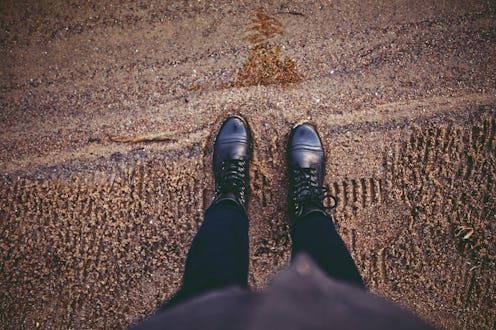Fashion
Are Your Tights Causing Your Yeast Infection?

Today I want to talk about vaginas. If you're seriously itchy down there, it could be caused by something totally unassuming. If you've ever wondered whether wearing tights can cause a yeast infection, you are definitely not alone. I hate to break it to you legging lovers, but it could be your tights. I know this is not the kind of news you want to hear headed into fall and winter.
From a personal six-month-long nightmare saga with yeast infections my junior year of college, I honestly can't tell you what a weird privilege it is to help you out now if you're struggling. #SisterhoodOfTheYeast-CausingPants for real! I know recurring yeast infections can make you feel hopeless, upset, and completely unsexy, but I've come out of the pit of RAGING FIRE BURNING ITCH OH GOD despair and promise you will too.
According to Sports Doctor, most yeast infections are caused by Candida Albicans, and "athletic women may be prone to yeast infections because of the hours they spend training in workout clothes that retain moisture and don't allow the pubic area to dry out." But whether you're wearing pantyhose, nylon, and synthetic fabrics while working out or just out on the town, Everyday Health explained those fabrics "hold moisture close the skin [and] encourage the growth of yeast." Well damn.
Does this mean you have to throw away all your cute opaque tights for winter? No! The tips below helped me get my crazy yeast infections under control. However, before you try any of my tips below, if you're experiencing frequent yeast infections, I'd advise you to talk with your doctor first.
Here are seven tips for combatting yeast infections come leggings and tights season.
1. Wear Breathable Fabrics
No-Show Thong Sport Panty, $12, Victoria's Secret
PopSugar suggests swapping out synthetic fabrics for "clothing made out of fabrics containing polypropylene or fabrics such as COOLMAX and SUPPLEX [and] a couple of pairs of wicking undies." As much as I love going commando, wearing breathable, wicking undies under tights really helped me out.
2. Popping Probiotics
Acidophilus And Probiotic Complex, $12, Trader Joes
Get in the habit of taking probiotic capsules daily to promote healthy bacteria that combats yeast infections, advises Prevention. The above is my favorite brand! Also, if you really don't think you'll remember to do this every day, I would at least urge you to always take probiotics when taking antibiotics to keep the good bacteria that prevents yeast from growing.
3. Dodge Alcohol, Bread, Sugar, And Caffeine
I'm not advising you to swear off the deliciousness listed above forever because life without coffee is no life at all in my opinion. However, Livestrong pointed out these foods can cause an overly-acidic vaginal PH where yeast will flourish. GRRRRR.
4. Opt For Progestin-Only Birth Control
Laurie Cullen, ND, a naturopathic physician and a professor at Bastyr University, told Prevention that estrogen-based birth control pills can contribute to yeast infections, and "it is worth considering nonestrogen methods such as progestin-only mini pills and IUDs." All about that PH balance, my friends.
5. Consider Over-The-Counter & Prescription Anti-Fungals
Monistat Vaginal Anti-Fungal Cream, $10, Amazon
WebMD shared how "you can treat most vaginal yeast infections with an over-the-counter vaginal cream or suppository" widely available at drugstores. If those don't work, chat with your doctor about a prescription pill and/or cream.
6. Use Water-Based Lube
Ultra-Smooth Water-Based Lube, $8, Shibari
If your lube is glycerin-based, you're essentially shoving sugar up your vagina every time you have sex. Sugar = yeast food, so you can see how this is not an amazing idea. Reach for a water-based lube instead, suggests NBC news.
7. When All Else Fails, Boric Acid
Boric Acid, $10, HUMCO
Sticking cockroach poison up your vag? Trust me, people. After months of over the counter and prescription anti-fungals, no coffee, no cute tights, more or less no sex, and even being so desperate as to stick probiotics up my vagina (health message boards can get weird!), gel capsules filled with boric acid capsules inserted into my vagina for ten nights straight literally saved my life. This is now my go-to strategy and I try not to worry about if it's not going to work one day because it always does.
Columbia's Go Ask Alice! column backs me up here. Alice considers "using boric acid suppositories [as] one option that is widely considered to be safe." Of course, she advises, "Before starting treatment, a visit to your health care provider can confirm that what you are experiencing is truly a chronic yeast infection and provide guidance on the best method of treatment for you."
Hang in there, you're not alone, and there is light (err uhm, a happy vagina?) at the end of the tunnel!
Image Credit: Kaboompics; Sam-Cat, Monik Markus/Flickr; Courtesy of Brands